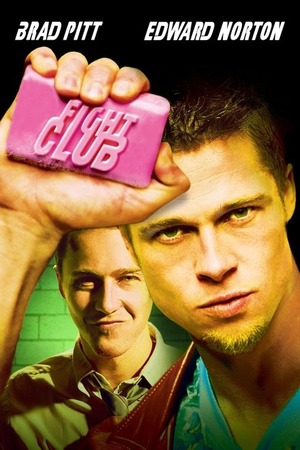
Director: David Fincher
Starring:Edward Norton, Brad Pitt, Helena Bonham Carter, Meat Loaf
👊 Introduction: The Cult Classic of Contradiction
David Fincher’s Fight Club (1999) is more than just a film about violence or anti-establishment rage—it is a nihilistic, postmodern critique of identity, consumerism, and the fractured modern psyche. Adapted from Chuck Palahniuk’s 1996 novel, the story follows a disillusioned narrator (played by Edward Norton), who finds escape from his sterile corporate life in the form of underground fistfights, guided by the anarchic Tyler Durden (Brad Pitt). What begins as a visceral reaction to boredom and despair soon evolves into a cult-like revolution, known as Project Mayhem, aimed at dismantling the entire capitalist system.
On the surface, Fight Club is a grim, testosterone-driven drama. Beneath that, however, is a dense web of symbolism and themes that interrogate masculinity, identity, conformity, and the emptiness of modern life.
🛋️ Consumerism as Spiritual Emptiness
“The things you own end up owning you.” This line from Tyler Durden encapsulates one of the film’s most enduring themes: the illusion of selfhood through material acquisition. The Narrator’s apartment, filled with IKEA catalogs and curated furniture, becomes a parody of 1990s consumerist culture. He is not a person, but a construct—a man defined by his possessions, his wardrobe, and his job title.
Consumerism, in the world of Fight Club, is not just an economic system; it is a form of spiritual malaise. The symbolic destruction of the Narrator’s apartment triggers a psychological unraveling. He replaces his polished facade with brutal physical experiences. The shift from sterile interiors to blood-soaked basements reflects a regression from corporate culture to primal instinct—a rebellion against the capitalist illusion of individuality.
🧠 Dissociation & Duality: Tyler as the Shadow Self
Perhaps the most important symbolic element in the film is Tyler Durden himself. As the film reveals, Tyler is not a separate person but a dissociated personality—a manifestation of everything the Narrator represses. Tyler represents chaos, instinct, aggression, and rebellion. He is the Jungian shadow made flesh.
This split between the Narrator and Tyler speaks to modern identity fragmentation. In a world that demands order, conformity, and restraint, the psyche finds ways to express forbidden impulses. The fights are not just about violence—they are about catharsis, about reclaiming suppressed parts of the self. Tyler is not evil; he is necessary, born from imbalance. His eventual dominance symbolizes what happens when we ignore the darker parts of our psyche—they take over.
🥊 Masculinity in Crisis
At its core, Fight Club is a portrait of wounded masculinity. The men in the film feel emasculated by modernity: they work unfulfilling jobs, shop for furniture, and suffer silent existential pain. Fight Club becomes a ritualistic space to recover a sense of power and agency through physicality. The violence is not glorified but ritualized—it’s the only language these men have left to express their despair.
Symbolically, the underground club functions as both a womb and a crucible. It destroys the weak exterior imposed by society and births a new identity rooted in shared suffering. The exaggerated masculinity on display is not a celebration but a critique. Fincher’s camera lingers on bruises, blood, and decay—not triumph. The film asks: what happens when men are stripped of purpose in a culture that sells them false empowerment?
📜 Anti-Establishment & Project Mayhem
As Fight Club morphs into Project Mayhem, the narrative veers into fascist territory. Tyler’s teachings evolve from personal empowerment into blind allegiance. Project Mayhem is not a revolution—it is another form of control. The symbolism here is chilling: a movement that begins with liberation becomes yet another hierarchy, replacing one master with another.
The shift reflects how anti-establishment ideologies, when unchecked, can mirror the very structures they oppose. The film’s bleak irony is that Tyler, who mocks authority, becomes a cult leader. The members of Project Mayhem chant, obey, and surrender their identities. In doing so, they contradict the original purpose of the club—to reclaim selfhood.
🪞Marla Singer: The Existential Disruptor
Marla Singer (Helena Bonham Carter) functions as a symbolic disruptor. She is a mirror—damaged, sarcastic, yet brutally real. Her presence forces the Narrator to confront emotional intimacy. Where Tyler offers escape and fantasy, Marla offers accountability. Their dynamic exposes the central conflict of the film: the difficulty of being authentic in a world designed to suppress vulnerability.
Marla represents the feminine force missing from the hyper-masculine chaos of Tyler’s world. She grounds the Narrator in real emotional stakes. When he begins to acknowledge his connection with her, the Tyler persona weakens. Symbolically, love—however flawed—offers a way out of the ego-driven spiral of violence and domination.